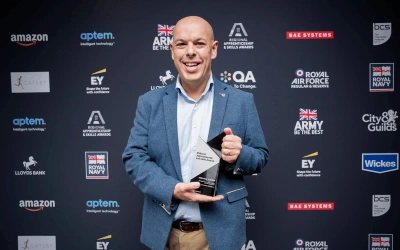Working in the talent-short technology market, I often talk to our clients about what the “perfect” candidate’s profile would look like. Some are looking for a candidate to prove they have previously used all the technologies on a client’s wish-list; others more to bring new skills to an organisation, and crucially they are always looking for someone who will make a positive impact to their teams.
With the technology skills gap in the UK increasing all the time at present, I’m a big advocate of our clients broadening their horizons when it comes to the profile of their new recruit. Those of you who have read or watched Moneyball will be familiar with this concept. There’s a scene where Billy Beane says it’s no longer “Business as usual”, and the way his staff think about recruitment needs to change.
In many ways, the technology market is in a similar situation. With the scarcity of candidates, as well as the economic and political uncertainty, being rigid with what you look for won’t work.
Now, hiring is usually one of the most expensive processes a company undergoes. So, you want to get the right person each time. The last thing you want is to have spent three months recruiting someone, only for them to leave within the same period of time!
But what are the steps you can take to make sure you are hiring the right person and not just the best person on paper? Below are a few things I would suggest.
Get your recruiter to 'get' you
The first thing you should do is invest in the hiring manager-recruiter relationship. Consider how long hiring managers spend providing recruiters with the full information on a role, and how long recruiters spend finding out about your organisation. Do they really ‘get’ what you do and how it all works?
Quite frankly, if the person looking for your talent doesn’t really know what to look for, your chances of getting the right hire are low.
At Lorien, our own attrition rate is exceptionally low. And that allows us to create real experts in our field. Some of us have worked with the same clients for two decades!
This allows us to make good judgements on whether a candidate would be a good fit for them. It’s not uncommon for us to place candidates whose CVs don’t fully match with the job descriptions, but are perfect fits for the clients – and these tend to go on to become great successes.
Communicate your culture
Something that doesn’t normally appear in a job description, but is nevertheless crucial, is how your team gets things done. What’s their approach? What’s the manager’s leadership style?
All of this should be in the job description, or at the very least be presented to the candidate during the recruitment process.
For example, will the role be in a fast-moving team which has the ability to make decisions on the spot and need to iterate quickly? If so, and the candidate has come from a slower-paced, more bureaucratic organisation? In which case, they need to be made aware of this. You can then ensure that they are comfortable with this significant change to their working structure.
Improve Interviews
I’ve written previously about the importance of interviewing and ensuring that unconscious bias is removed from the process as best as possible. I would also argue that while both structured and unstructured questions do have a place within candidate selection, answering on past experience isn’t always a solid indicator for future performance. When you consider how well-versed in interviewing technology candidates are now, this is even more pertinent.
My preference would be towards ‘work sample’-style questions, which are more in line with the environment the candidate could soon be working in. These can still be structured. But in place of asking a candidate about previous experience, try asking them how they would deal with typical on-the-job problems.
This is a more effective indicator of how they will react within your environment, what their thought process is, and their overall fit. If you go back to Moneyball again, you will remember that they hired players who possessed the behaviour needed for their specific position. They based their decision on observing the player’s skills at a training camp, as well as scientific assessments. This was regarded as more important than any prior experience or achievements – in other words, more important than what’s on a CV.
Trust in tech
There are also several tools available which can assist companies when assessing cultural fit. There are occasions where a company culture has been grown organically through the people at the business; and even the hiring managers themselves can’t quite define it. By using things like Persona Mapping, where existing employees are analysed, you can start to define this.
You can also increase candidate engagement by using AI and Gamification for assessments. With one client recently, we used an assessment which tested all the key skills required for the roles. Unlike most screening tools, this incorporated computer game-style assessments and neuroscience. We were then able to access meaningful, job-relevant data, plus a full 360 degree view of a candidate rather than just focusing on technical skills.
Fundamentally, hiring within technology is not about finding the individual with the most technical skills, experience, or qualifications. It’s about finding the ‘right’ person who will provide the biggest improvement to your organisation.
As I said, hiring people is usually the one of the most expensive processes that we go through – can we afford to get it wrong?
To find out more about Lorien’s Consultancy Services, including assessment-building, please do reach out to me via Darren.Topping@Lorien.co.uk.







